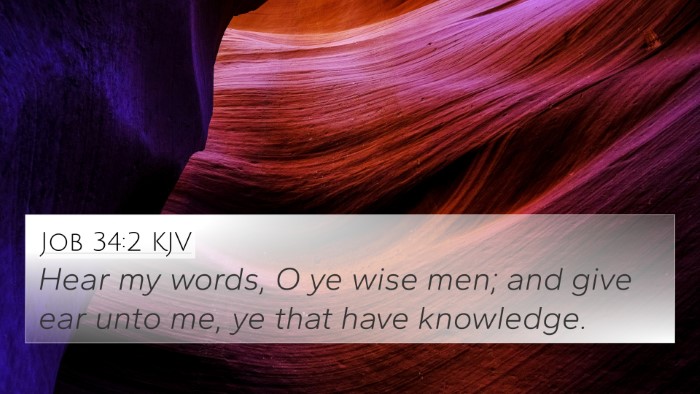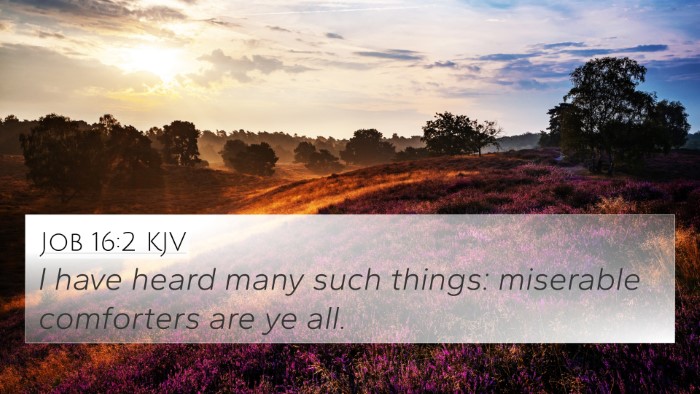Understanding Job 21:2
Job 21:2 states, "Hear diligently my speech, and let this be your consolations." This verse marks the beginning of Job's intense discourse on the injustices he perceives around him, particularly regarding the apparent prosperity of the wicked while the righteous suffer.
Summary of Insights
The following are insights drawn from public domain commentaries by Matthew Henry, Albert Barnes, and Adam Clarke that provide a deeper understanding of this verse.
- Matthew Henry:
- Henry emphasizes the importance of listening carefully to Job's words, suggesting the need for attentive consideration in the face of profound suffering and existential questions.
- He notes that Job seeks consolation not only for himself but also for his friends, encouraging them to understand the depth of his suffering.
- Albert Barnes:
- Barnes highlights the desire of Job to present his case clearly, asserting the necessity for others to comprehend his perspective to engage in meaningful dialogue.
- He points out the imperative of hearing Job’s argument, which contrasts the fate of the wicked and the righteous, a theme key to Job's discourse.
- The request for "consolations" underlines Job's need for empathy and comprehension from his companions in his distress.
- Adam Clarke:
- Clarke elaborates on the linguistic aspects, discussing the Hebrew nuances of the term "consolations," which may imply that Job is looking for a deeper understanding and partnership in sorrow.
- He critiques the complacency of Job's friends, asserting that they must actively engage with the truth of Job’s experience instead of offering superficial platitudes.
Contextual Analysis
Job's speech represents a pivotal moment in the Book of Job, where he confronts his friends about their misinterpretations of suffering. This verse is part of a larger argument that questions widely held beliefs about divine justice and human suffering.
Cross References
To deepen understanding, the following Bible verses offer cross-references that relate to Job 21:2:
- Job 10:1: "I loathe my very life; therefore I will give free rein to my complaint and speak out in the bitterness of my soul." - Similar themes of suffering and the need for understanding.
- Job 13:23-24: "How many wrongs and sins have I committed? Show me my offense and my sin. Why do you hide your face and consider me your enemy?" - A parallel in Job’s quest for justice and acknowledgment of his plight.
- Psalm 73:3: "For I envied the arrogant when I saw the prosperity of the wicked." - This verse further reflects the struggles of dealing with the prosperity of the wicked, a key theme in Job's speech.
- Romans 12:15: "Rejoice with those who rejoice; mourn with those who mourn." - Connects to Job’s desire for empathy and emotional sharing during suffering.
- Ecclesiastes 7:15: "In this meaningless life of mine I have seen both of these: the righteous perishing in their righteousness, and the wicked living long in their wickedness." - Echoes Job’s observations about justice.
- Matthew 5:45: "He causes his sun to rise on the evil and the good, and sends rain on the righteous and the unrighteous." - Highlights the shared experiences of both the good and the evil, applicable to Job’s discourse.
- John 16:33: "In this world you will have trouble. But take heart! I have overcome the world." - Offers hope amidst suffering, relevant to the themes in Job.
- James 1:2-4: "Consider it pure joy, my brothers and sisters, whenever you face trials of many kinds..." - Addresses the essence of trials that Job contends with.
Thematic Connections
The themes of suffering, justice, and the search for understanding are prevalent in Job 21:2 and can be cross-referenced with various scriptures to form a more holistic view. For instance, the connections between Job’s lament and Ecclesiastes’ reflections on the seeming futility of righteousness in a world filled with wickedness create a dialogue across the scriptures.
Tools for Bible Cross-Referencing
It's instrumental to use tools for effective Bible cross-referencing to enhance understanding. Some of these tools include:
- Bible concordances
- Bible cross-reference guides
- Comprehensive Bible cross-reference materials
- Bible reference resources
Conclusion
Job 21:2 serves as a significant reminder of the complexities surrounding suffering and divine justice. Engaging with this text, along with its cross-references, allows for a deeper exploration of the human condition and the dialogues present within the scriptures. By listening to Job's plea, we gain insights into the nature of empathy, understanding, and the quest for divine answers in our own lives.












